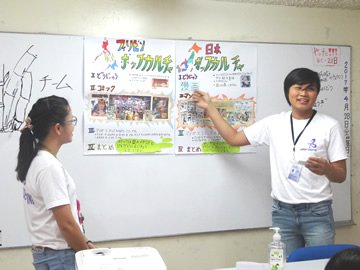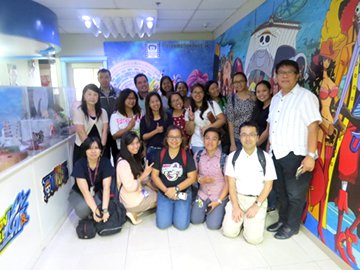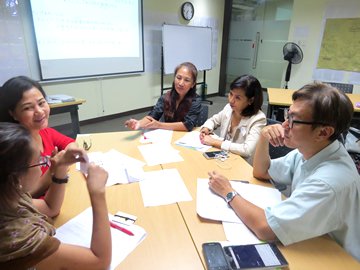Japanese-Language Education Support in The Japan Foundation, Manila
The Japan Foundation, Manila
EPA training team: HAYAKAWA Naoko, IKEZU Joji, ISHIKAWA Akiko, KUNITOU Asahi, MIYAZAKI Satomi
Secondary school education and teacher development team: MORITA Mamoru, KUWANO Sachiko, SHINTANI Chika
Course and teacher development team: TAKEI Kojiro, ISHIDA Hideaki
“I am About to Start Work in Japan, So…”
- Pre-arrival Japanese-language training based on EPAs -
Since 2011, preparatory pre-arrival Japanese-language training has been carried out in the Philippines for nurses and certified care worker candidates, on the basis of the Japan-Philippines EPA (Economic Partnership Agreements). In the latest intake, which was the ninth, Japanese-language training was offered to a total of 315 people, comprising 35 nurse candidates and 280 certified care worker candidates, at a training facility in Metro Manila over a six-month period from November 2016.
As preparation for ensuring the candidates undertake their training and employment effectively once they have traveled to Japan, this training had three pillars. In addition to “the Japanese language,” it notably also incorporated “autonomous learning” and “sociocultural understanding.” Where “sociocultural understanding” was concerned, in addition to lecture-type lessons where the candidates learnt about the circumstances in Japan, they also had opportunities to actually use the Japanese they had learned up to that point in classes known as “Practical use of the Japanese language, and cultural understanding.”
One of the classes, “Investigative learning: Comparing Japan and the Philippines,” was carried out in April at the final stage of the training. The candidates summed up and presented the differences between the Philippines and Japan in subjects of their choosing, including “ghosts,” “weddings” and “work,” and question and answer sessions were even held. This was a unique opportunity for the candidates to freely demonstrate their four skills in the Japanese language. We were amazed to witness candidates who could hardly speak any Japanese at the start of the training communicating animatedly in Japanese, and we hope strongly that their dreams in Japan can be realized when they begin their lives there in June.

Candidates giving a poster presentation
A Visit to an Admired Company
At The Japan Foundation, Manila, Japanese-language teacher training for high school teachers is carried out in partnership with the Philippines Department of Education. The teachers participating in the training are working teachers who thus far have been teaching their specialist subjects, such as English, Social Studies and Filipino. Since these teachers already possess the skills needed to capture students’ attention and design lessons, the focus of the training is on mastering basic Japanese and Japanese-language teaching methods. Learning Japanese from scratch in order to become Japanese-language teachers while simultaneously overseeing their specialty subjects is no easy task for these teachers, but armed with their inherent cheerfulness, they are valiantly pressing ahead.
Japanese Anime is familiar to people in the Philippines, particularly young people. Anime-themed lessons have even been prepared in “enTree - Halina! Be a NIHONGOJIN!!-,” the Japanese-language teaching material produced for Philippine high school students by The Japan Foundation, Manila, and it is being favorably received by both students and teachers. A major Japanese Anime production company actually set up a business in Manila more than 30 years ago, and a large number of Anime that are well-known even in Japan are produced in the company’s studio. Recently, the production company was kind enough to allow the teacher trainees to visit the company during their training. The studio was divided into separate rooms according to each stage of the process, and inside them were large numbers of animators focusing on their painstaking tasks. In a recap of the visit a few days later, some participants expressed surprise, noting that “I have been watching Japanese Anime since I was a child but I never realized creating one Anime required so much time,” while others emphasized their perspective as teachers, saying “I want to take students along next time.” Going forward also, we hope to assist Japanese-language teachers and students to connect to the outside world through a range of opportunities.

Visit to the Anime production studio
Promoting the Appeal of Japanese-Language Teacher
On a Friday evening once every two months, a workshop known as “The Teachers’ Circle” is held by The Japan Foundation, Manila. The presenters are varied, but include us, in our role as Japanese-Language Specialists, as well as Philippine Japanese-language teachers.
The content of these workshops is wide ranging, and includes beginner to intermediate levels of grammar, pronunciation and so forth. The participants are for the most part Philippine teachers, but people aspiring to become teachers can also take part, as can Japanese nationals who are teachers. These workshops are thus good venues for exchanging information. People wanting to participate need to register in advance, but participation on the day is also accepted, and on top of that, there is no charge. The fact that the workshops are free can conversely be a disadvantage, because in some cases there are few participants, and contrastingly, in some cases the number of participants is greater than the number of advance registrations.
At a recent workshop also, around 20 people had pre-registered but only five actually showed up. This was apparently the result of the rain that fell on the day, which made Manila’s infamous congestion even worse and made it impossible for some to attend. Nevertheless, the five who did come enjoyed themselves, which was a good thing.
Demand for training as a teacher is failing to keep up with the rapid growth of Japanese-language learners in the Philippines. This is seeing teachers whose teaching skills are lacking, and furthermore whose Japanese-language skills are poor, end up in classrooms. Furthermore, in more than a few cases, once teachers’ Japanese-language ability improves they quit teaching and go to work in the corporate sector. Recently it has become clear to us that while teaching methods are important, so too is promoting the appeal of Japanese-language teaching as a career through workshops, seminars and so on.

Participants consider a discussion topic
- What We Do Top
- Arts and Cultural Exchange [Culture]
- Japanese-Language Education Overseas [Language]
- Japanese-Language Education Overseas [Language] Top
- Learn Japanese-language
- Teach Japanese-language
- Take Japanese-Language Test
- Know about Japanese-language education abroad
- The Japanese-Language Institute, Urawa
- The Japanese-Language Institute, Kansai
- Japanese-Language Programs for Foreign Specified Skilled Worker Candidates
- Japanese Language Education for Japanese Children Resident Overseas and for the Descendants of Migrants
- Archives
- Japanese Studies and Global Partnerships [Dialogue]
- JF digital collection
- Other Programs / Programs to Commemorate Exchange Year
- Awards and Prizes
- Publications
